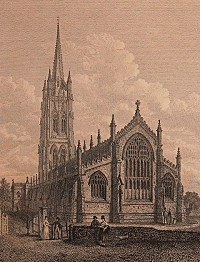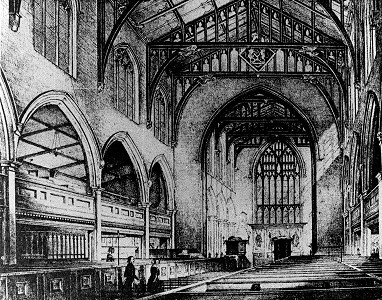Luke Barton, an improper parish clerk

St James' Church

Interior of church
Many former Louth residents were admirable people. Luke Barton was not:
In the eighteenth-century the parish clerk was an important person who assisted at church services and led the responses. On 30 March 1752, the vicar Rev Stephen Ashton, churchwardens and principal inhabitants of Louth assembled in the vestry and signified their "disapprobation and dislike of Luke Barton" as their parish clerk, and proposed Edward Gray instead.
Barton, who by trade was a barber and rope-maker, was described as utterly devoid of moral strength and worth. During divine services, he either did not say Amen or said it at improper times. When it was his turn to read the alternate verses of the psalms, he seldom read the whole verse. As an act of defiance, he headed a mob of his cronies into the middle aisle of the church and set out a psalm during the service and there sang and interrupted divine worship. In the vestry room he misconducted himself with women of bad fame.
Rev Dr Cecil Willis came to Louth in November 1754 to examine the witnesses in the parish church. But the court soon left its cold quarters, adjourning to the Old King's Head Inn (now New Street), and thence to the house of one of the local gentry.
The vicar's maidservant described a violent scene in Louth vicarage. When Barton had been summoned to make payments to the vicar, he had run towards the vicar, nearly throwing him backwards into the fire. The two churchwardens said that they had heard Barton utter most shameful expressions to the vicar.
The midwife testified that she had often seen Barton intoxicated at christenings and funerals. When she had been near his house during the night, she had observed young men and women rioting and squealing to such a degree as to disturb the whole neighbourhood.
The schoolmaster stated that Barton could not read distinctly, and did not make regular responses that could be understood by the congregation. He had a strong loud voice, but no manner of decency. The curate said that Barton was so intoxicated one Sunday that he could not stand upright.
Baron stole bread intended for the poor. Only Barton possessed the key to that part of the church where the bread was kept, but eventually it was discovered that he had embezzled 34 loaves.
Finally on 31 January 1755, Barton's licence was cancelled, he was condemned with expenses of £30, he was excommunicated, and Edward Gray's appointment confirmed. So, at long last, the miserable affair was at an end. A newspaper report informs us that in 1761 Barton was a prisoner in Lincoln Castle.
Source: Pemberton, W A. 1961. The Lincolnshire Historian, 2(8) A Parish Clerk of Louth and the Law in the Eighteenth Century.